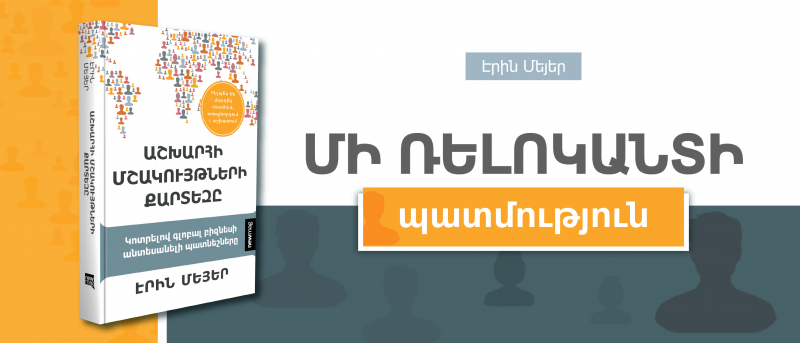The “Relocant”'s Formula: I will not do what is needed; I will learn how to do what is needed (video)

"The Culture Map" by Erin Meyer serves as a comprehensive guidebook for all. Its insights offer invaluable solutions that can not only safeguard your job and career but also assist in navigating through disagreements with colleagues, especially when roote
Common Ground is one of the most famous cafe-bookstores in Yerevan. It was opened last year. The name suggests they are trying to find fertile ground for effective communication. The founder is Grigory Korelsky. He did not face the problem of cultural features; he managed to study them and use them in favor of the cafe. According to him, before opening the cafe, he studied the business and market of books and cafes for a year, then also Armenian businessmen.
"In trying to work with my Armenian colleagues, let me single out one big, important feature that will help a lot. Personal connection. It is not like the Russian lodge, which is dry, purely practical. In the Armenian business environment, there should always be coffee, company, spending time together. That's the only way you can establish ties, do business with Armenians."
Grigori has become a real connoisseur of cultural features and a bridge for Armenian and Russian colleagues. The main partners in business are Armenians, the cafe's visitors and book lovers are also very different.
"The main problem of booksellers in Armenia, regardless of cultural and national characteristics, regardless of whether you are Armenian, Russian, Englishman or American, is the same: twenty percent value-added tax. Taxes on books in Armenia are very high."
As an experienced "relocant," he possesses a keen understanding of the challenges faced by newcomers. With a level of attentiveness akin to that of a native, he offers valuable guidance to those who have been forcibly displaced from Artsakh, as well as to those who have relocated to Armenia from Israel. He encourages both groups to leverage the experiences of newcomers to facilitate a smoother and quicker adaptation process.
"We've adapted, haven't we? You've taught us well." The key in this endeavor is to recognize the strengths inherent in every community and individual. Those who have relocated to Armenia should be encouraged to freely express themselves, rather than becoming a burden on society. Each person brings valuable experiences that may be lacking in their new environment. By allowing them to discover their own potential and adapt effectively, they can become invaluable assets”.
He considers genuine interest and open communication to be the key to overcoming cultural differences. He recommends applying his formula before starting a business in Yerevan. “I will not do what is needed; I will learn how to do what is needed”.
Read also

Winterfest to feature David Georgyan’s sci-fi action novel Impedance (trailer)

At Winterfest 2026, Newmag will present Marianna Hakobyan’s “Don’t Change the Names” (trailer)

Closing and Award Ceremony of the “Sprout in Armenian – 2025” Competition at Newmag Winterfest

“I hope my story will inspire many and help them keep believing and dreaming.” Henrikh Mkhitaryan’s welcoming speech to Armenian fans (video)

